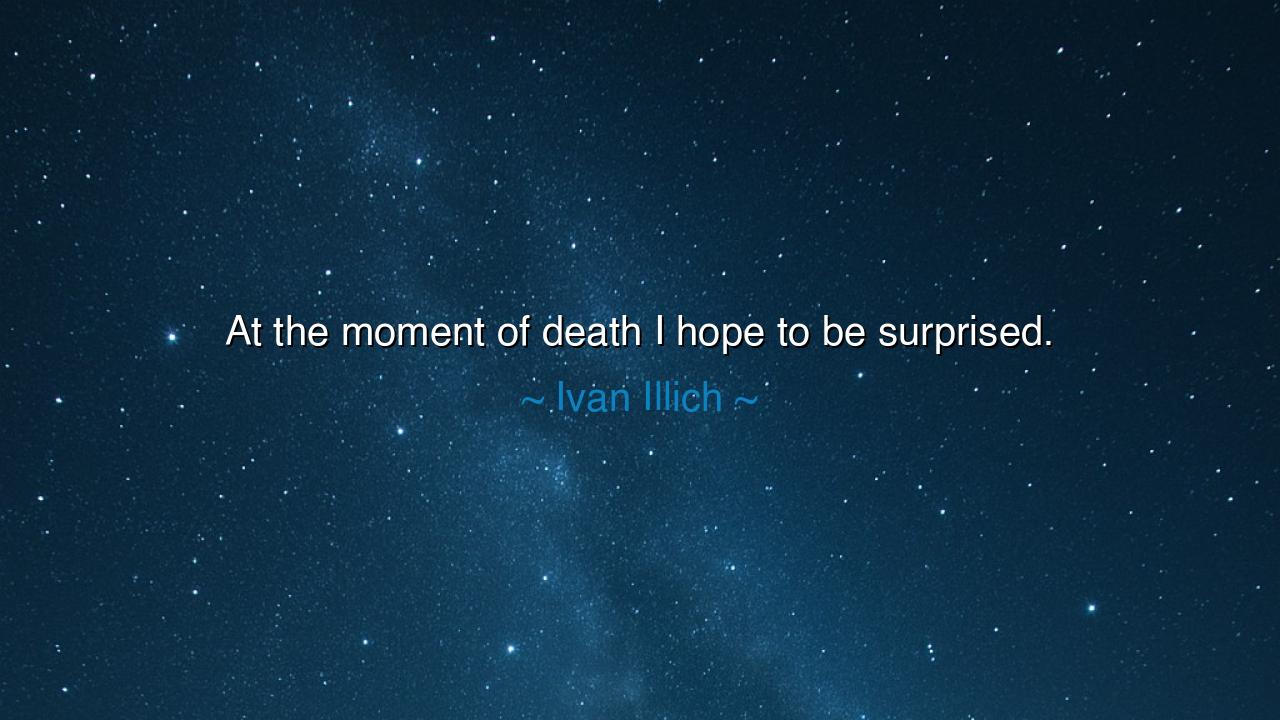
At the moment of death I hope to be surprised.






Hearken, children of the earth, and contemplate the words of Ivan Illich: “At the moment of death I hope to be surprised.” In these words lies a meditation on the mystery of life and the inevitability of mortality. The ancients often spoke of death not as an end alone, but as a passage—a threshold whose nature could never be fully known. To hope for surprise in that moment is to embrace uncertainty with courage, curiosity, and a spirit attuned to the unknown.
Illich’s reflection evokes a profound attitude toward life and death. To live with the hope of being surprised is to accept that certainty is an illusion and that the ultimate moment of transition may bring revelations beyond human imagination. The Stoics counseled that death is natural and unavoidable, yet the wise meet it without fear, understanding that life’s value lies in the quality of engagement and the cultivation of virtue rather than in control over its end.
The notion of surprise in death carries both humility and openness. It acknowledges that no matter how much one learns, plans, or experiences, there remains a domain beyond comprehension. Socrates, in his final hours, spoke calmly of death as a passage to another state, unknown yet perhaps welcoming. Like him, Illich suggests that one’s readiness to encounter the unexpected is a measure of wisdom, a testament to a life lived with openness rather than rigidity.
Consider the life of Anne Frank, whose young years were overshadowed by persecution and uncertainty. Though she could not foresee her fate, her writings reflect a spirit attuned to wonder, reflection, and the unexpected joys of existence. To hope for surprise is not naïve; it is the cultivation of a mind prepared to meet the unknown with grace, curiosity, and acceptance—a mindset that transforms fear into openness.
Illich’s words also remind us of the necessity of living fully. If one approaches life with the expectation of control, predictability, or rigid certainty, death becomes a source of dread. But to cultivate the hope of surprise is to embrace each moment with engagement, to treasure experiences, and to recognize that life’s meaning often emerges in unanticipated ways. The unexpected is not merely a threat but a gift, revealing the richness of existence beyond the ordinary.
The lesson is clear: to live wisely is to accept mortality while maintaining openness to the unknown. Death, like life, may present experiences beyond comprehension. To hope to be surprised is to meet this inevitability with courage, curiosity, and the humility that honors both the limits of knowledge and the boundless possibilities that lie beyond.
Practical action flows from this teaching. Live with awareness of impermanence, yet embrace each day with openness and curiosity. Cultivate experiences that stretch understanding, engage fully with others, and remain receptive to the unforeseen. Reflect on mortality not as fearsome, but as a reminder to prioritize authenticity, meaning, and attentiveness in every act.
Thus, let the generations to come carry this wisdom: hope for surprise at the moment of death is hope for the unknown, openness to mystery, and courage in the face of certainty’s end. Ivan Illich reminds us that life is not merely the accumulation of days but the cultivation of a spirit prepared to encounter the unexpected, to find wonder in the final threshold, and to embrace mortality with grace, curiosity, and humility.
If you wish, I can also craft a more narrative, story-driven version, illustrating Illich’s philosophy through historical and literary examples of individuals who faced death with openness and courage, perfect for audio narration, to make the lesson about mortality, hope, and acceptance even more immersive. Do you want me to do that?






AAdministratorAdministrator
Welcome, honored guests. Please leave a comment, we will respond soon